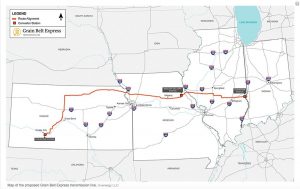
The Grain Belt Express Transmission Line is moving forward again after an Illinois Appeals Court lifted a court order that had stalled its progress in the state.
The line carries wind-powered electricity from Southwest Kansas and across Missouri and into Illinois and Indiana. The ruling allowing its movement forward came after the 5th District Appeallate Court lifted a stay that had been issued on the project.
The stay of “any implementation” of a March 8 order from the Illinois Commerce Commission granting the project a Certificate of Public Convenience and Necessity (CPCN) until the court rules on the project’s constitutionality was first issued by the court on Aug. 18.
The initial stay came after Illinois Farm Bureau and landowner groups requested the court pause the ICC’s order approving the project while their appeal of the project was pending. GBE had sent letters to landowners seeking easements, and IFB and the other plaintiffs contended a stay in the case was needed to preserve landowners’ rights while the court considers the appeal.
IFB and the other plaintiffs in their appeal argued the 2021 state law allowing GBE to apply for and obtain ICC approval for the project violates the special legislation, equal protection and separation powers clauses of the Illinois Constitution.
GBE contested the court-ordered pause, filing an appeal of the stay on Aug. 25. In its appeal, GBE argued the court’s order was unclear and that it had the right to negotiate with landowners regardless of the CPCN.
IFB and the other plaintiffs filed a motion to reconsider the withdrawal of the stay, but the appellate court denied it.

The lifting of the stay means that GBE may seek easements and access to property for surveying while the appeal moves forward before the court, with briefs and eventually oral arguments expected over the next few months.
Because the case is on appeal, it’s uncertain whether the appellate court will ultimately allow GBE’s project to move forward, said Laura Harmon, associate counsel with Illinois Agricultural Association.
Harmon noted GBE has not requested — nor has the ICC granted GBE — eminent domain authority, and that landowners who have received letters from GBE should contact or obtain legal counsel for advice.
“The letters GBE sent to landowners do not request permission to survey, but we understand that land agents hired by the company are seeking oral permission from landowners to survey,” Harmon said.
“Landowners should request that GBE provide a written request to survey and negotiate a property access agreement prior to any surveying activity.”
Added Harmon: “The Illinois Public Utilities Act provides that an entity with a CPCN may conduct land surveys after it sends written notice to landowners. In addition, the notices are required to state when land surveys will begin and inform the landowner that they or their agent may be present.”
The appellate case is not the first time IFB has challenged the constitutionality of the project, which carries a long history.
In 2015, the ICC approved GBE’s application to construct, operate and maintain the high-voltage electric transmission line. IFB challenged the approval, and in 2018 a state appellate court ruled the ICC lacked authority to grant a nonpublic utility company a certificate of public convenience and necessity under the expedited review process of the Illinois Public Utilities Act.
That court also ruled GBE didn’t meet the definition of a public utility.
In 2021 the Illinois General Assembly passed legislation allowing GBE to apply for and obtain approval of its project from the ICC, which again took up consideration of the project in August 2022.
The ICC in March voted unanimously to approve the project, citing the special provisions under the law, which required it to find that the project is for the public use and promotes public convenience and necessity.
The decade-old 600-kilovolt (kV) high-voltage, direct current electric service transmission line project, acquired by Chicago-based Invenergy in 2018, already has approval from regulators in Kansas, Missouri and Indiana.
It would stretch 800 total miles and be capable of providing 5,000 megawatts (MW) of electricity generated by wind turbines and solar fields in southwest Kansas to utility providers across the four states.
Illinois would serve as the connecting point of the multi-state transmission line, with a 207-mile stretch across the state through parts of nine counties.
The route approved by the ICC would see the transmission line, after crossing the Mississippi River, enter Illinois west of New Canton, in Pike County, then extend 207 miles southeast through parts of Scott, Greene, Macoupin, Montgomery, Christian, Shelby and Cumberland counties before transitioning at a converter station in Clark County.
Source: Grain Belt Express






